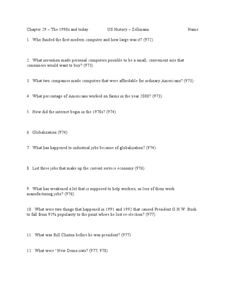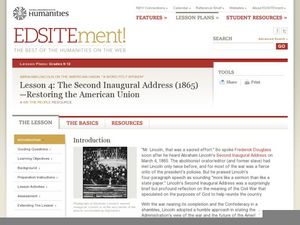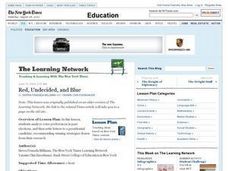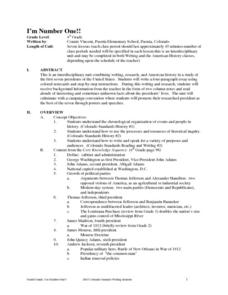Curated OER
Chapter 22 – The 1950s
For this 1950's America worksheet, high schoolers read assigned textbook pages about the decade and respond to 47 short answer questions.
Curated OER
Fractured Facts for Civics
In this fractured facts for civics worksheet, 9th graders correct 24 sentences by replacing certain phrases if they are incorrect, but not all need to be corrected, answers are included.
Curated OER
Chapter 29 – The 1990s and Today
In this 1990s America worksheet, students read assigned textbook pages about the time period and respond to 49 short answer questions.
Curated OER
General Knowledge Quiz About the USA
In this facts about America worksheet, students complete a 14 question multiple choice on-line interactive quiz about the U.S.A. Included are historical facts, famous people, and landmarks.
Curated OER
Last Moments of John Brown
Students read the history of John Brown. Using the internet, they research commentaries on the raid at Harper's Ferry. After observing a painting, "The Last Moments of John Brown," students analyze and write about what they see, think...
Curated OER
Who Freed the Slaves During the Civil War?
Pose the question to your historians: who really freed the slaves? They critically assess various arguments, using primary sources as evidence. In small groups, scholars jigsaw 5 primary source documents (linked), and fill out an...
Humanities Texas
A President's Vision: Theodore Roosevelt
Through an engaging, interactive experience analyzing primary sources, invite your young historians to take a closer look at the presidency of Theodore Roosevelt.
Curated OER
Cartoons for the Classroom: Celebrating the 19th Amendment
Eighty-eight years after women earned the right to vote, a women ran for president. Young analysts consider the role women play in politics, how they are portrayed, the standards they are held to, and if they are still treated unfairly...
Curated OER
The Second Inaugural Address (1865)—Restoring the American Union
High schoolers explore the content of Abraham Lincoln's Second Inaugural Address. For this Abraham Lincoln lesson, students analyze the text of the speech to determine how Lincoln sought to reconstruct the country as the Civil War drew...
Curated OER
Consequences of the Sedition Act
Students research and discuss the consequences of the Sedition Act. They illustrate the difficulty of balancing security needs and personal freedom using an example from John Adams's presidency.
Curated OER
The Election Is in the House: 1824: The Candidates and the Issues
Learners list some changes in presidential election laws and/or procedures since 1796, and cite examples from presidential campaign materials from 1824.
Curated OER
Nov. 2, 1976 | Carter Defeats Ford in Presidential Election
After reading about the presidential race in 1976, learners think critically about presidential legacy. They read all of the provided background information, related New York Times articles, and then respond to a writing prompt via blog...
Curated OER
Sentence Completion 17
These words are tough! Very advanced English language learners or native speakers will still be befuddled by some of these vocabulary words. For each of the six sentences provided, learners must choose the correct word to complete the...
Curated OER
Early Presidents
Students are introduced to the lives and contributions of the first seven presidents of the United States. They, in groups, conduct further research on one of these president and his political platform and design a presentation for the...
Reading Through History
The Federalist Papers: Federalist Paper No. 51
How did Federalists feel about the federal government? Learners search for the answers in the Federalist Paper No. 51, which discusses the powers of the presidency. Then, they answer various questions to test for their comprehension of...
Curated OER
You Either Know it or You Don't 5
In this Internet research skills worksheet, students respond to 15 short answer trivia questions. Students may use reference sources if they don't know the answers.
Curated OER
Brooks-Baxter War
Sixth graders discuss and research the Brooks-Baxter War and the election of governor for Arkansas in 1872. In this election lesson plan, 6th graders read about the candidates for governor and why the election was disputed.
Curated OER
With malice toward none, with charity for all: The life of Abraham Lincoln
Students research Abraham Lincoln in a variety of ways. For this Abraham Lincoln lesson plan, students use primary sources, vocabulary activities, books, and more to research and learn about Abraham Lincoln.
Curated OER
The Gettysburg Address: An American Treasure
Learners apply information found in Lincoln's speeches, especially The Gettysburg Address, to create a persuasive speech on a current topic.
Curated OER
The Election Is in the House: Was There a Corrupt Bargain?
Students take a stand, supported by evidence, on whether there was a "corrupt bargain" between Henry Clay and John Quincy Adams.
National Endowment for the Humanities
Lesson 2: The Debate in Congress on the Sedition Act
Pupils research and discuss the provisions in the Constitution that supported the arguments for and against the Sedition Act. They articulate objections to and arguments in favor of the Sedition Act.
Curated OER
Red, Undecided, and Blue
Students analyze voter preferences in past elections, and then write letters to a presidential candidate, recommending winning strategies drawn from their research.
Curated OER
I'm Number One!
Fourth graders complete a unit of lessons on the first seven presidents of the U.S. They conduct research, write a four-paragraph essay, and create posters and speeches for a simulated campaign convention.
Curated OER
Thomas Jefferson on the Sedition Act
Students research and cite arguments Jefferson used in objecting to the Sedition Act. They discuss Jefferson's opinion on how constitutional questions about the Sedition Act could be resolved.

























